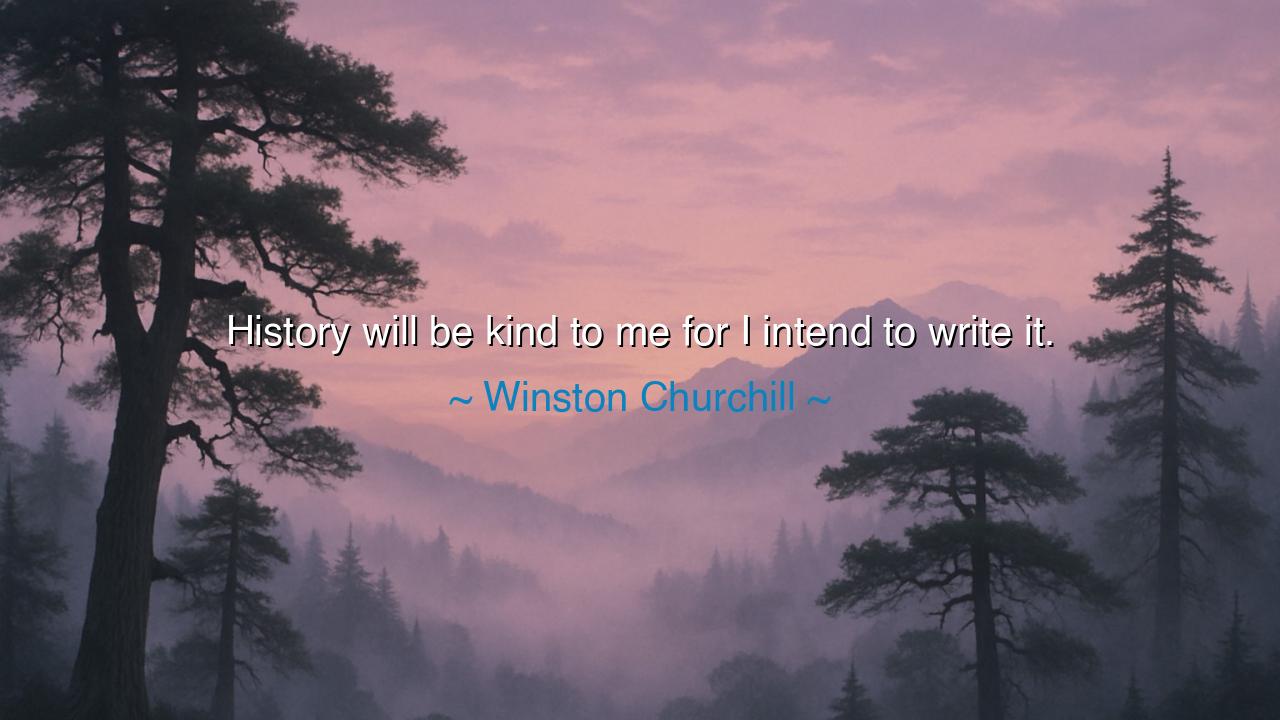
History will be kind to me for I intend to write it.






"History will be kind to me, for I intend to write it." – Winston Churchill
So spoke Winston Churchill, the lion of Britain, a man who stood alone when the world trembled under tyranny’s shadow. In this sharp and fearless declaration, “History will be kind to me, for I intend to write it,” he revealed not only his wit, but his profound understanding of the relationship between power and narrative, between deed and remembrance. These words are not a boast — they are an acknowledgment of a truth as old as civilization itself: that history is shaped not only by those who live it, but by those who tell it.
The origin of this quote lies in Churchill’s dual life as both statesman and writer. Before he became Britain’s Prime Minister, he was already a historian, a war correspondent, and a man obsessed with the written word. He chronicled wars, empires, and the rise and fall of nations with the precision of a scholar and the flair of a poet. Later, after guiding his country through the dark years of the Second World War, he did indeed write history — in his six-volume masterpiece, The Second World War. Through his own hand, he ensured that his vision, his struggles, and his triumphs would be preserved not merely as events, but as legend. In that sense, his prophecy came true: history was kind to him because he became its author.
But there is a deeper wisdom in his words — a warning to every soul that history is not a neutral force. It is a living story, molded by memory, perspective, and will. The ancients understood this well. The chronicles of empires were carved by victors, the songs of heroes sung by their own tribes, while the voices of the defeated were often lost to time. Churchill, who studied the tragedies of fallen nations, knew that to survive history’s judgment, one must not only act bravely but also preserve one’s truth against the distortions of others. To “write history,” therefore, means to take ownership of one’s story — to ensure that the meaning of one’s deeds is not buried beneath the noise of politics or the passage of years.
Consider the story of Napoleon Bonaparte, whose brilliance was both celebrated and condemned by his enemies. Long after his downfall, imprisoned on the lonely island of Saint Helena, he dictated his memoirs, seeking to rewrite the image history would hold of him. Though defeated, he understood that words have a power armies cannot conquer. Churchill, too, learned from this — that the pen, as he himself once said, is mightier than the sword, for it shapes how the sword’s stroke will be remembered. Thus, to write one’s own history is not vanity, but survival of spirit.
Yet Churchill’s quote also carries a timeless moral beyond politics or war. It speaks to every human being who wishes to live deliberately. Each of us writes our own history — not always in books, but in deeds, in words, in the memories we leave behind. The world may judge, misinterpret, or forget, but those who act with purpose and integrity write their truth upon the hearts of others. To live passively is to let others define you; to live consciously, courageously, is to author your own destiny.
There is also humility beneath his humor. For Churchill knew that history’s kindness cannot be commanded — it must be earned. His life was filled with failures as well as triumphs: political defeats, military blunders, and public criticism. Yet he faced each with unwavering courage, trusting that the arc of his story would one day be understood. And indeed, it was. His words and deeds, shaped by time and ink, became a testament to perseverance — proof that those who live boldly, who fight for what they believe, will not be forgotten.
So remember, my child of the future: history is not written by chance — it is written by will. Do not let others define your story. Live as Churchill lived — with conviction, with courage, and with a pen in your hand. Speak your truth, record your journey, and stand by your ideals even when the world doubts you. For though time may judge, it also listens; and those who live with purpose will find, as Churchill did, that the final word belongs not to fate, but to the one who dares to write it.






AAdministratorAdministrator
Welcome, honored guests. Please leave a comment, we will respond soon